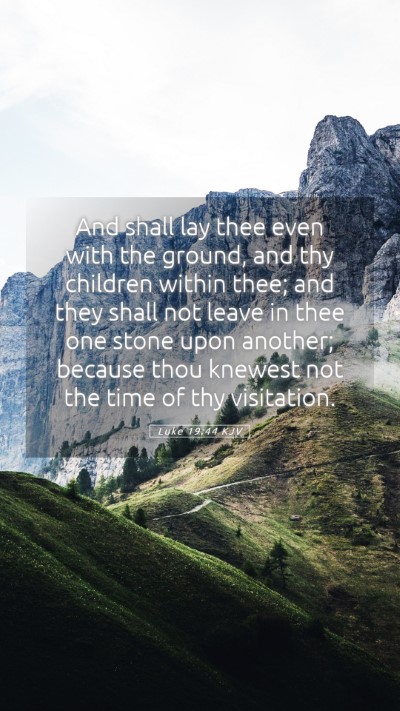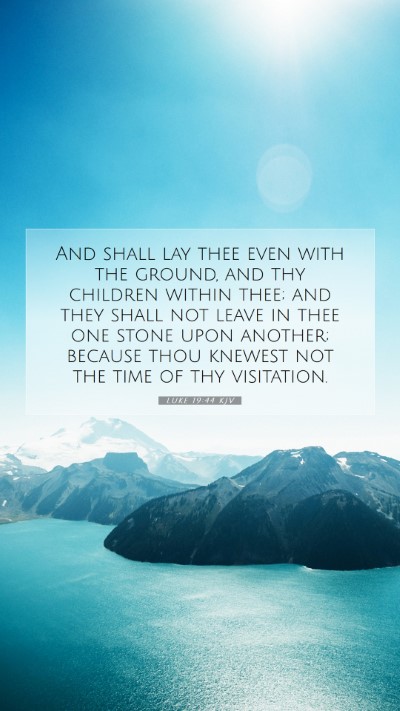Understanding Luke 19:44 - A Comprehensive Bible Verse Commentary
Luke 19:44 states, "And shall lay thee even with the ground, and shall cast thy children within thee, and they shall not leave in thee one stone upon another; because thou knewest not the time of thy visitation." This verse encompasses profound implications regarding God's judgment and the consequences of rejecting divine revelation.
Historical Context and Significance
This verse occurs in the context of Jesus' lament over Jerusalem as He approaches the city before His crucifixion. It reflects on the spiritual blindness of the people and the repercussions of their failure to recognize the Messiah and the signs of God's presence among them.
Insights from Commentaries
- Matthew Henry: Henry emphasizes the tragic fate of Jerusalem due to its inhabitants’ disregard for Jesus' teachings. He notes that their failure to perceive the time of their visitation signifies a missed opportunity for salvation and restoration.
- Albert Barnes: Barnes points out the historical fulfillment of this prophecy during the Roman siege of Jerusalem in 70 AD, illustrating the tangible consequences of rejecting God's messenger. He reflects on the devastation that follows such a rejection.
- Adam Clarke: Clarke provides a theological perspective, explaining that the laying waste of Jerusalem serves as a warning to all who neglect the gospel. He indicates that the children's reference points towards the future generations who would also suffer due to the sins of their forebears.
Biblical Exegesis of Key Elements
The Visitation of God
The phrase "the time of thy visitation" refers to the opportunity for repentance and acceptance of God's grace. The refusal to acknowledge this moment not only highlights the people's ignorance but also foreshadows the devastating consequences of such a decision.
Prophecy and Fulfillment
The prophetic nature of this statement reveals an essential aspect of Scripture analysis—understanding how Old Testament prophecies and warnings manifest in the New Testament events. Jesus, in lamenting over Jerusalem, points to a culmination of the prophetic tradition, urging audiences to recognize and respond to divine intervention.
Application of the Verse
Understanding Luke 19:44 extends beyond its historical context; it serves as a poignant reminder for contemporary believers. It invites reflection on how we perceive and respond to God’s presence in our lives today.
Practical Implications
In applying this verse to daily life, individuals can consider the following:
- Are we aware of the moments God calls us to repentance and grace?
- How does spiritual blindness affect our relationship with God and others?
- What steps can we take to honor God’s visitation in our lives?
Cross References
The significance of Luke 19:44 can be enriched by examining the following related scripture passages:
- Matthew 23:37-39 - Jesus' lament over Jerusalem
- Jeremiah 7:30-34 - Prophecies of judgment against Jerusalem
- Luke 13:34-35 - Jesus expresses a similar lament for the city
- Matthew 24:1-2 - Jesus predicts the destruction of the temple
- Revelation 11:2 - The holy city tread down by the Gentiles
Conclusion
The interpretation of Bible verses like Luke 19:44 requires careful examination of both the historical context and theological implications. The insights gathered from various public domain commentaries highlight the importance of recognizing God’s call, understanding the repercussions of rejection, and the need for spiritual vigilance. Such reflections can inform our Bible study lessons, enhance our Bible study resources, and ultimately guide our online Bible study efforts.
Encouragement for Further Study
As we dive deeper into Bible verse meanings and Biblical exegesis, it is beneficial to engage in Bible study groups and utilize Bible study tools to enhance our understanding. These resources can offer comprehensive insights into understanding difficult Bible passages and applying Bible verses to daily life.


